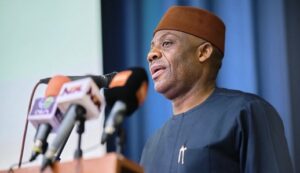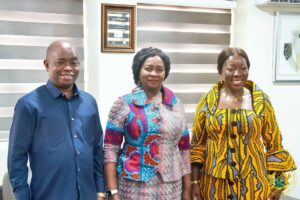
As the sun set over the bustling city of Lagos, Amara Okeke stood on the rooftop of a high-rise building, staring at the horizon. The sky was painted in shades of orange and pink, a perfect backdrop for the photoshoot she had planned.
Clad in a vibrant Ankara dress, her dark skin glowing in the evening light, Amara was the epitome of modern African beauty. But this moment was more than just a photoshoot; it was a step towards building her personal brand in the world of modeling—a journey that had taken her from the quiet streets of Aba to the glamorous heights of Lagos.
Amara’s journey into modeling was not a typical one. Growing up in Aba, a city known more for its entrepreneurial spirit than its fashion scene, she had always felt a deep connection to fashion. Her mother, a seamstress, would create beautiful garments from colorful fabrics, and Amara would model them around the house. However, the idea of becoming a professional model seemed like a distant dream—until social media entered her life.
It all started when Amara’s cousin, Nneka, returned from Johannesburg, South Africa, with stories of how young people were using platforms like Instagram to showcase their talents. Nneka showed Amara profiles of models, photographers, and designers who had gained international recognition through their social media presence. Inspired by these stories, Amara decided to create her own Instagram account, @AmaraAfrika, where she could share her love for fashion with the world.
At first, Amara’s posts were simple—pictures of herself in traditional Nigerian attire, selfies with friends, and snapshots of her daily life in Aba. But as she began to understand the potential of social media, she realized that she needed to be more strategic if she wanted to stand out in the crowded world of online influencers. She started researching successful models and influencers, studying how they presented themselves, interacted with their followers, and collaborated with brands.
One key lesson Amara learned was the importance of authenticity. While it was tempting to imitate the styles of famous models, she knew that her unique identity as an African woman was her greatest asset. She decided to embrace her roots, showcasing not only her beauty but also the rich cultural heritage of Nigeria. Her content became a blend of fashion and culture—she would wear modern outfits inspired by traditional designs, collaborate with local artisans, and share stories about the significance of different fabrics and styles.
As her following grew, Amara faced a new challenge: maintaining consistency while keeping her content fresh and engaging. She knew that building a personal brand required more than just beautiful photos; it demanded a connection with her audience. She began to post regularly, sharing insights into her life, her struggles, and her dreams. She also made an effort to engage with her followers, responding to comments, hosting Q&A sessions, and even offering advice to aspiring models.
One day, while scrolling through her Instagram feed, Amara came across a post from a fellow model, Zola, who was based in Nairobi, Kenya. Zola’s profile was a blend of high-fashion photoshoots and candid moments from her life. What intrigued Amara the most was how Zola used her platform to advocate for causes she cared about, such as women’s empowerment and environmental sustainability. Inspired by Zola’s approach, Amara decided to add more depth to her content by using her platform to raise awareness about issues close to her heart.
Amara’s first foray into activism on social media came after a trip to Makoko, a floating slum in Lagos. She was moved by the resilience of the people living there, particularly the women who worked tirelessly to support their families despite the harsh conditions. Amara decided to use her platform to highlight their stories, sharing photos and videos from her visit and encouraging her followers to support local initiatives aimed at improving the lives of Makoko residents. The response was overwhelming—her posts went viral, and she received messages of support from people all over Africa and beyond.
This experience taught Amara the power of social media not just for building a personal brand but also for making a positive impact. She began to collaborate with NGOs and charitable organizations, using her influence to promote their causes. She also started a YouTube channel, where she shared her experiences as a model, gave fashion tips, and discussed topics like body positivity and self-confidence.
As Amara’s influence grew, so did the opportunities that came her way. She received invitations to walk the runway at fashion shows in Accra, Ghana, and Kigali, Rwanda. She also signed endorsement deals with African fashion brands, becoming the face of campaigns that celebrated African beauty and style. Yet, despite her success, Amara remained grounded, always remembering the community that had supported her from the beginning.
In her journey, Amara encountered challenges that tested her resolve. The modeling industry, both online and offline, was highly competitive. There were times when she felt overwhelmed by the pressure to maintain her image and keep up with the latest trends. Negative comments and criticism from online trolls also took a toll on her mental health. However, Amara was determined not to let these challenges deter her. She sought guidance from mentors, surrounded herself with a supportive network of friends and family, and focused on her goals.
One of the most rewarding aspects of Amara’s journey was the connections she made with other African models and influencers. She joined online communities where they shared tips, collaborated on projects, and supported each other’s growth. Amara was particularly close to Aisha, a model from Dakar, Senegal, who had a similar approach to blending fashion with cultural identity. Together, they organized virtual workshops for aspiring models, offering advice on everything from building a portfolio to navigating the complexities of the modeling industry.
Looking back on her journey, Amara realized that social media had not only helped her build a personal brand but had also opened doors she never imagined possible. From a small town girl with big dreams to an influential figure in African fashion, she had carved out a space for herself in the digital world, using her platform to celebrate her heritage, empower others, and create a lasting impact.
As the sun finally dipped below the horizon, Amara glanced at the photos on her camera. The images were stunning, capturing the essence of who she was and what she stood for. But more importantly, they were a testament to the power of authenticity, resilience, and the ability to turn a dream into reality. In that moment, Amara knew that her journey was far from over—there were still new heights to reach, new stories to tell, and new ways to inspire others. And with social media as her stage, the world was watching.








